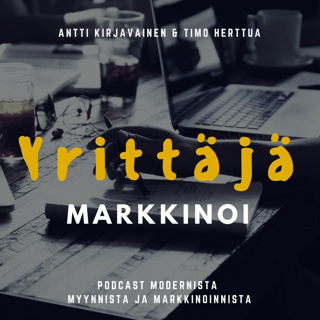
613: Microsoft CTO on AI, Human Agency and the Future of Work
Technology is reshaping the world at a pace few people, inside or outside the industry, expected. But every so often, you meet someone who has not only witnessed the major waves of technological change, but helped build them. In this conversation, Marcus Fontoura, Technical Fellow and Corporate Vice President at Microsoft, CTO for Azure Core, walks us through the story of AI, what leaders are getting wrong, and how to develop the one thing that will matter more than any model or algorithm: human agency. Marcus has lived through every major inflection point: early search, the rise of cloud computing, and now large-scale AI systems. One of the first things he challenges is the popular narrative that we are heading toward an AI apocalypse, or an AI utopia. Both extremes, he explains, miss the point: "My approach was more like, let me just explain what the technology is and what it does… it's basically a prediction system." Marcus offers a clear explanation of modern AI. He compares today's large models to a system that has: "Read nonstop for fifty thousand years… with near perfect memory." But this doesn't make AI a mastermind. It makes it a stochastic parrot, extraordinarily capable, but not self-directed. He also emphasizes that while AI will automate the mechanical layers of work, it will amplify, not replace, the leaders who know how to think: "If your job is typing in a spreadsheet… then I would feel scared. But if you have the knowledge and experience to really add value, I wouldn't feel scared." His point is: the danger isn't AI. The danger is becoming someone who only performs tasks AI can do. We also cover the uncomfortable but increasingly visible trend: people relying on AI so heavily that they lose their independent critical-thinking muscles. Marcus acknowledges the risk: "That is a little bit concerning… we will see good uses of technology and uses we don't want to happen." He stresses that organizations must raise the bar for juniors, not lower it, and that AI helps experts more than novices: "More experienced folks already know what to expect… junior employees may not know what is correct or incorrect." This is one of the most important insights in the entire episode: AI accelerates expertise; it does not create it. On hallucinations, Marcus is exceptionally candid: "The more we use it, the more you have techniques to avoid it… but we have to double-check those things." On leaders fearing displacement: "Use AI in a way that amplifies your skills… automate the mechanical tasks and focus on what only humans can do." And on what truly matters in this moment of technological upheaval: "Technology shouldn't influence us. We should influence what we want to see in our society." And he gave a useful explanation of the names of ChatGPT models: "When you say that bigger AI models, when you move from ChatGPT three to four, four to five, basically these models have more parameters. So this means that you read a lot more, but also you memorize a lot more." This conversation is a reminder that the most important focus should not be AI, it's the leader using AI with judgment, clarity, and agency. Get Marcus's book, Human Agency in a Digital World, here: https://shorturl.at/v0lo8 Claim your free gift: Free gift #1 McKinsey & BCG winning resume www.FIRMSconsulting.com/resumePDF Free gift #2 Breakthrough Decisions Guide with 25 AI Prompts www.FIRMSconsulting.com/decisions Free gift #3 Five Reasons Why People Ignore Somebody www.FIRMSconsulting.com/owntheroom Free gift #4 Access episode 1 from Build a Consulting Firm, Level 1 www.FIRMSconsulting.com/build Free gift #5 The Overall Approach used in well-managed strategy studies www.FIRMSconsulting.com/OverallApproach Free gift #6 Get a copy of Nine Leaders in Action, a book we co-authored with some of our clients: www.FIRMSconsulting.com/gift
25 Joulu 54min

612: How to Have More Hope with Dr. Julia Garcia
In this episode, Dr. Julia Garcia explains why hope is a habit and why it is critical for us to remove what blocks hope. She describes what happens inside teams when leaders lose hope, including "the culture that creates, the burnout that leads to, the discouragement and defeat." Julia shows how unprocessed emotions drain leaders even when they appear high-functioning. "If we emotionally feel disconnected, we're going to start looking elsewhere or we're going to end up in a place of hopelessness where maybe we completely shut down in our career and now we're just a robot." One of the most memorable insights is the use of the word "maybe" to interrupt destructive thought cycles. She explains: "Maybe your next idea is the one that's going to change the game for you." "Maybe that failure wasn't a failure. It was a setup." "Maybe you have everything you need right now." Julia also demonstrates how holding unspoken emotions limits our capacity. "We can function by holding all these things in emotionally… but we actually aren't discovering what we're truly capable of because we're not fully available." Julia shares her own experiences with failure and rebuilding: "None of this was a waste. I can repurpose this." and "Maybe I can learn from this. Maybe I can come back stronger." We also discuss AI. Julia warns: "AI is increasing productivity, but it is decreasing the personal humanity." and "We need people in our problem solving. We need people in our products." She closes with the central message of her book: "Hope is a habit… it is the single greatest predictor of success and health." Get Dr. Julia's book, The 5 Habits of Hope, here: https://shorturl.at/rjpNF Claim your free gift: Free gift #1 McKinsey & BCG winning resume www.FIRMSconsulting.com/resumePDF Free gift #2 Breakthrough Decisions Guide with 25 AI Prompts www.FIRMSconsulting.com/decisions Free gift #3 Five Reasons Why People Ignore Somebody www.FIRMSconsulting.com/owntheroom Free gift #4 Access episode 1 from Build a Consulting Firm, Level 1 www.FIRMSconsulting.com/build Free gift #5 The Overall Approach used in well-managed strategy studies www.FIRMSconsulting.com/OverallApproach Free gift #6 Get a copy of Nine Leaders in Action, a book we co-authored with some of our clients: www.FIRMSconsulting.com/gift
22 Joulu 53min

611: Former U.S. Intelligence Officer on AI, Leadership, and Thinking Like a Spy (with Anthony Vinci)
In this conversation, Anthony Vinci explains that "AI is going to be able to do more and more of what people do." He describes a future where "AI is going to get better and better at doing what people do," and highlights that leaders must understand "how do you figure out what AI is good at and then implement it to do that" and "how do you manage your workforce so that they are able to partner with that AI." He warns that leaders often "overestimate what AI can do and underestimate it at the same time," and stresses the importance of "getting that balance right." As he shared, "sometimes they can sense that, oh, AI can do anything," while others say "it will never do that," and both assumptions can mislead decision making. He offers direct guidance for staying relevant: "The number one thing I would recommend is literally to just go use AI for thirty minutes a day." He urges leaders to "push the envelope" and "see where the holes are, what it won't do." Vinci describes how workflow—not just technology—defines whether AI succeeds. Implementation requires understanding "the process and the workflow," recognizing that AI adoption "is going to be small parts," and building "those pieces over time." He explains the subtle dangers of influence, noting that AI can "change your mind" without you realizing it. The threat is not dramatic deepfakes but "what if it just changes one word?" or "an adjective and makes something seem slightly different." To stay resilient, he urges people to "think like a spy," recognize that "there might be a bad actor on the other side," and build habits of "triangulating information." He emphasizes cognitive agility: "We still need to learn to do it so that you can think about mathematics and understand mathematics," and he connects this to thinking and writing in an AI-driven world. Even with powerful tools, "you're still going to have to keep yourself sharp." Vinci closes by discussing perspective, explaining how "living abroad" showed him how much people assume about how the world works. He encourages listeners to embrace the belief that "maybe this assumption that you have in life is wrong," because "the difference between being okay or good at something you do and being great is this ability to take a step back and question whatever you see in the world." Get Anthony's book, The Fourth Intelligence Revolution, here: https://shorturl.at/rjpNF Claim your free gift: Free gift #1 McKinsey & BCG winning resume www.FIRMSconsulting.com/resumePDF Free gift #2 Breakthrough Decisions Guide with 25 AI Prompts www.FIRMSconsulting.com/decisions Free gift #3 Five Reasons Why People Ignore Somebody www.FIRMSconsulting.com/owntheroom Free gift #4 Access episode 1 from Build a Consulting Firm, Level 1 www.FIRMSconsulting.com/build Free gift #5 The Overall Approach used in well-managed strategy studies www.FIRMSconsulting.com/OverallApproach Free gift #6 Get a copy of Nine Leaders in Action, a book we co-authored with some of our clients: www.FIRMSconsulting.com/gift
17 Joulu 53min

610: Cas Holman on Play, Creativity, and the Future of Work
When was the last time you played, really played? For Cas Holman, founder and chief designer of Heroes Will Rise and star of Netflix's Abstract: The Art of Design, play isn't childish. It's the foundation of human creativity, resilience, and connection. She worked with LEGO, Disney Imagineering, and the LEGO Foundation and on a mission to help adults rediscover what children know instinctively: that play is how we learn, adapt, and feel alive. "Play isn't what happens after work," Cas explains. "It's how we manage uncertainty. It's how we cope, experiment, and find our way through the unknown." In this conversation, Cas reframes play not as a distraction from productivity but as the engine of it. She explains why play is essential for innovation, executive presence, and emotional agility, and how suppressing it has drained creativity from our professional lives. "Playful thinking lets us reframe success," she says. "It makes us flexible enough to keep moving when things don't go according to plan." We discuss: Why free play (activities that are intrinsically motivated, freely chosen, and personally directed) is the most powerful form of creative renewal. How reframing success turns frustration into discovery: "You came to play basketball, the ball's flat, the court's full, so what? Invent a new game." Why curiosity and uncertainty are not threats to be managed, but conditions for growth. How "breaking" systems or routines can reveal how they actually work. And how adults can learn to release judgment, the internal critic that says "I should know the answer" instead of "let's find out." Cas's insights are strikingly relevant to the age of AI. As technology automates more of what we do, she reminds us that what matters most is how we create, not how efficiently we delegate creation. "We're outsourcing the wrong things," she says. "Creativity wasn't the problem that needed fixing. It's what makes us feel alive." Get Cas' book, Playful, here: https://shorturl.at/jxR4O Claim your free gift: Free gift #1 McKinsey & BCG winning resume www.FIRMSconsulting.com/resumePDF Free gift #2 Breakthrough Decisions Guide with 25 AI Prompts www.FIRMSconsulting.com/decisions Free gift #3 Five Reasons Why People Ignore Somebody www.FIRMSconsulting.com/owntheroom Free gift #4 Access episode 1 from Build a Consulting Firm, Level 1 www.FIRMSconsulting.com/build Free gift #5 The Overall Approach used in well-managed strategy studies www.FIRMSconsulting.com/OverallApproach Free gift #6 Get a copy of Nine Leaders in Action, a book we co-authored with some of our clients: www.FIRMSconsulting.com/gift
15 Joulu 55min

609: UCLA Professor and MD on How Gravity Shapes Your Health and Mind
Dr. Brennan Spiegel, Director of Health Services Research at Cedars-Sinai and Professor of Medicine and Public Health at UCLA, author of the book Pull, explains why illness is often a failure to manage gravity. He describes how our relationship with gravity defines strength, balance, digestion, mental stability, and emotional health. Take the Gravotype Quiz at BrennanSpiegelMD.com to identify how your body manages gravity. Key Insights and Action Steps — Dr. Brennan Spiegel "Every single cell of your body evolved from this force of gravity. Physics came first, and biology came second." Illness arises when we fail to manage gravity. Every organ, tendon, and cell depends on that relationship. "When you stand up straight and lift your diaphragm, it pulls up this sack of potatoes that we all have in our belly. When you open up the gut, it opens up digestion." Posture determines how well the gut, diaphragm, and circulation function. Sitting compresses digestion and lowers energy. "Your balance and relationship to gravity is a predictor of how long you're going to live." Balance, grip strength, and posture are measurable indicators of longevity. "The inner ear is like a gyroscope constantly keeping track of your position in relation to gravity." The nervous system continuously measures gravity. Inner-ear disturbances can create dizziness, anxiety, and panic. "When you're depressed, you can't get up out of bed. Your body is slumped over. It's almost like there's so much gravity pulling on your body, it's like you're in a black hole." Depression mirrors an excessive gravitational load. Emotional heaviness is a physical experience of being pulled down. "Strong negative emotional experiences can permanently change the way the brain forms… the mind has learned to be pulled down emotionally, physically, socially." Childhood trauma reshapes how the brain perceives gravity, making the body feel heavier and slower to rise. "The feet are a gravity management surface… only five percent of the body's surface area but holding one hundred percent of the weight." Feet are the interface between body and planet. Strengthening them restores alignment and balance. "Your relationship to the planet, both latitudinally and altitudinally, will determine your health." Altitude, light, and environment influence serotonin, immunity, and microbiome function. "Serotonin itself is a gravity management substance." Serotonin regulates mood and physical stability, linking emotional and gravitational balance. "When it's stimulated, it activates the rest and digest phase and helps release serotonin." The vagus nerve is the primary connection between body and mind, calming the system and improving serotonin flow. "I pretended I was on a bigger planet… I became stronger and stood up straighter." Carrying additional resistance through weighted movement improves posture, strength, and metabolism. "When we lay down to sleep, we give our body a break… the blood easily flows into our brain and flushes out amyloid." Sleep restores gravitational equilibrium and supports brain recovery. "Gravity doesn't change, but your relationship to gravity does." Long-term health depends on strengthening that relationship physically, mentally, and emotionally. Action Items from Dr. Brennan Spiegel 1. Identify your gravotype. Take the 16-question quiz at BrennanSpiegelMD.com to learn which of the eight gravotypes you belong to and how your body manages gravity. 2. Build gravity fortitude. Strengthen the muscles and bones that keep you upright — especially your back, core, and legs. "When you stand up straight and lift your diaphragm, it pulls up the gut and opens digestion." 3. Stand tall and move often. Avoid long hours of sitting. Use a standing desk or take frequent standing breaks. Sitting compresses the abdomen, slows digestion, and reduces serotonin. 4. Strengthen the diaphragm and posture daily. Practice standing with shoulders back and chin level to engage the diaphragm and improve breathing and gut function. 5. Train your balance. Test and improve balance by standing on one leg, walking heel-to-toe, or using a balance board. "Your balance and relationship to gravity is a predictor of how long you're going to live." 6. Practice grip and hanging strength. Hang from a bar daily. Aim for 30 seconds, then increase gradually toward 2 minutes. Even short "dead hangs" improve shoulder, spine, and nervous-system alignment. 7. Use light weighted resistance. Try a weighted vest or light ankle weights while walking or doing chores. "I pretended I was on a bigger planet… I became stronger and stood up straighter." 8. Walk, run, or train barefoot or in minimalist shoes (safely). Let the feet feel the ground to activate stabilizing muscles. "When you ground your foot, everything else pulls up straight from there." 9. Reconnect with the ground. Spend time standing or walking on natural surfaces (grass, sand, earth) when possible. 10. Stay hydrated. Keep enough fluid in your body to "pump blood and oxygen up into the brain." Dehydration weakens gravity tolerance and causes dizziness or fatigue. 11. Regulate the nervous system. Do slow, controlled breathing through pursed lips to stimulate the vagus nerve and calm the body. "Slow meditative breathing activates the rest-and-digest phase." 12. Consider gentle vagus-nerve stimulation. Use only safe methods such as breathing, humming, or medical devices under supervision. Avoid carotid massage unless advised by a doctor. 13. Strengthen vestibular and proprioceptive awareness. Engage activities that challenge coordination: yoga, dance, gymnastics, tai chi, or balance training. 14. Manage mental gravity. Notice emotional heaviness as a physical sensation; practice posture, breathing, and grounding to counteract "mental black holes." 15. Use awe and nature to elevate mood. Spend time in nature, watch sunsets, or listen to music that evokes awe. "Feeling part of something greater than yourself elevates mood and serotonin." 16. Increase natural serotonin. Seek sunlight, exercise outdoors, connect socially, and reduce processed foods. Serotonin helps both mood and muscle tone to "fight gravity physically and mentally." 17. Optimize sleep for gravitational recovery. Sleep 7–8 hours flat or slightly inclined if you have reflux. Avoid heavy meals within 2 hours of sleep. Limit screens before bed. "When we lay down to sleep, we give our body a break… the blood easily flows into our brain." 18. Manage reflux and digestion. If prone to reflux, raise the head of the bed about 10 degrees or use a wedge pillow. Sleep on your left side to reduce acid reaching the esophagus. 19. Support circulation through movement. Use your muscles as pumps, walk regularly, stretch calves, and move legs during travel or desk work to prevent stagnation. 20. Avoid chronic compression. Reduce time bent over laptops or phones; keep screens at eye level to protect diaphragm and digestion. 21. Engage with natural environments. Nature exposure increases serotonin and improves gravity resilience. "Being in green spaces is mood-elevating because that's what we evolved with." 22. Monitor environment and altitude. If you live or work at high altitude, be mindful of mood or sleep changes and adjust oxygen exposure and sunlight time. 23. Balance convenience with movement. Spiegel warns that modern comfort, constant sitting, processed food, artificial environments, represents "our species losing the battle against gravity." 24. Reframe health. Adopt the mindset that "gravity doesn't change, but your relationship to gravity does." Everything, from mood to digestion, is part of managing that relationship. Get Brennan's book, Pull, here: https://shorturl.at/XjNt3 Claim your free gift: Free gift #1 McKinsey & BCG winning resume www.FIRMSconsulting.com/resumePDF Free gift #2 Breakthrough Decisions Guide with 25 AI Prompts www.FIRMSconsulting.com/decisions Free gift #3 Five Reasons Why People Ignore Somebody www.FIRMSconsulting.com/owntheroom Free gift #4 Access episode 1 from Build a Consulting Firm, Level 1 www.FIRMSconsulting.com/build Free gift #5 The Overall Approach used in well-managed strategy studies www.FIRMSconsulting.com/OverallApproach Free gift #6 Get a copy of Nine Leaders in Action, a book we co-authored with some of our clients: www.FIRMSconsulting.com/gift
10 Joulu 52min

608: Harvard Professor and former CEO of Medtronic, Bill George, on How Leaders Should Manage Challenging Times
Bill George, former CEO of Medtronic and Harvard Business School Executive Fellow, explains how leaders can stay grounded, principled, and effective in chaotic times. "It's a world of chaos and it requires a very different kind of leader than in more stable times." The skills that once mattered (process control, long-term plans) are now secondary to courage, self-awareness, and moral clarity. George says most executives still lead comfortably "inside the walls" but fear the external world (media, public scrutiny, and rapid change). "Today, if you're a leader, you are a public figure. You have to face that reality." Leadership now starts with knowing your True North, your values and principles. "When everything's going your way, you start to think you're better than you are. When you lose, you learn your weaknesses." He warns: "The people who will struggle are those faking it to make it. They're trying to impress the outside world but aren't grounded inside." Purpose, not position, defines identity. "A CEO once said, 'Without a title, I'm nothing.' You won't hold that title forever. Who are you then?" True fulfillment comes from alignment between personal purpose and work. "Every business has a deep sense of purpose if it's well run. The ones that only make money, like GE, go away." He lists five traits of leaders who thrive in crisis: Face reality. Stay true to values. Adapt strategies fast. Engage your team. Go on offense when others retreat. Each requires courage. "You can't teach courage in a classroom. It has to come from within." He urges humility: "Leadership is all about relationships, it's a two-way street." His turning point came when he stopped "building a résumé" and started building people. He defines authentic leadership as growth through feedback: "I never walk into a classroom unless I'm going to learn from everyone there." And he closes with the core message: "You don't have to be CEO. If you can do great work and help others, you'll feel fulfilled. Leaders make the difference between success and failure." Key Insights (Verbatim Quotes) 1. Chaos demands a new kind of leader. "It's a world of chaos and it requires a very different kind of leader than in more stable times." 2. Authenticity starts with grounding. "Our true north is our principles, our beliefs, and our values all rolled into one." 3. Titles are temporary. "I am not the CEO of Best Buy. …That's the title I hold. I won't hold that forever." 4. Courage separates real leaders. "You can't teach courage in a classroom. It has to come from within." 5. Purpose drives resilience. "Every business has a deep sense of purpose if it's well run." 6. Leadership is relational. "I was building a résumé, not relationships. Leadership is all about relationships." 7. Fear destroys authenticity. "A lot of people are living in fear. That's no way to live your life." 8. Great leaders empower others. "You want everyone on your team to be better than you are at what they do." 9. Growth never ends. "Anyone who's authentic knows they have to continue to grow as a human being." 10. True success is internal. "You'll never have enough power, fame, or money. You find fulfillment within." Action Items "Face reality, starting with yourself." Look in the mirror and ask, "Maybe I'm creating this negative culture. What did I do wrong?" "Stay true to your purpose and your values." Never abandon principles when pressure rises. "Adapt your strategies and tactics." What worked yesterday may not work today. "Get your team involved." Say, "Hey guys, we've got a real problem. What ideas do you have to keep it going?" "Go on offense when everyone else is pulling back." Make bold moves when others retreat. "Have the courage to look yourself in the mirror." Courage starts with self-reflection. Ask, "What's the worst case? What do I have to lose?" and move forward without fear. "If one door closes, maybe another one's going to open that I never even saw." "Know who you are." Reflect on your life story, relationships, and crucibles that shaped you. "Don't get caught up in titles or money." Remember, "Without a title I'm nothing" leads nowhere. "Find a congruence between your purpose and the organization's purpose." "Every business has a deep sense of purpose if it's well run." Identify how yours helps people. "Get away from toxic leaders." If they drive you down, take credit for your work, or never support you, move on. "Work for people you feel really good about working with." "Learn all aspects of the business and how to integrate them creatively." "Pull together a cross-disciplinary team" and act as the integrator. "Have everyone on your team be better than you are at what they do." "Be the glue." Integrate experts to solve tough problems. "Care about your people first." They must know you care before they'll perform. "Get everyone into their sweet spot" — where they use all their skills and are highly motivated. "Align everyone around purpose and goals." "Challenge people to reach their full potential." Say, "I know you can do better. Let's take your game to the next level." "Get out there and be with the people." Don't hide behind PowerPoints. "Help your people do better." Work beside them. "Believe in someone who doesn't believe in themselves." Tell them, "You have this potential. Go for it." "Find someone who believes in you." A mentor, boss, or spouse who sees your potential. "As a leader, be that person who believes in others." "Face your blind spots." Ask people who care about you for honest feedback. "If you get feedback from people that care about you, take it in." "Stop building a résumé and start building relationships." "Take time for people. Ask, 'How are you doing today? What challenges are you facing?'" "Leadership is all about relationships — it's a two-way street." "Tell the truth — the good, the bad, and the ugly." "Stay away from blame." Take responsibility instead of pointing fingers. "Be transparent." Don't hide problems; fix them. "Never fake it to make it." "Keep growing as a human being." "Take feedback and adapt." Growth requires awareness of impact on others. "Believe in yourself even if you fail." Failure is learning. "Spend time reflecting on your purpose and the person you are becoming." "Help other people reach their full potential." "Measure success by how many people you help every day." "Remember: leadership is about who you are, not what title you hold." Get Bills book, True North, here: https://shorturl.at/bRXsK Claim your free gift: Free gift #1 McKinsey & BCG winning resume www.FIRMSconsulting.com/resumePDF Free gift #2 Breakthrough Decisions Guide with 25 AI Prompts www.FIRMSconsulting.com/decisions Free gift #3 Five Reasons Why People Ignore Somebody www.FIRMSconsulting.com/owntheroom Free gift #4 Access episode 1 from Build a Consulting Firm, Level 1 www.FIRMSconsulting.com/build Free gift #5 The Overall Approach used in well-managed strategy studies www.FIRMSconsulting.com/OverallApproach Free gift #6 Get a copy of Nine Leaders in Action, a book we co-authored with some of our clients: www.FIRMSconsulting.com/gift
8 Joulu 55min

607: Raj Sisodia on Conscious Capitalism and How Business Can Heal the World
Raj Sisodia has spent his life asking one question: Can business make people's lives better instead of draining them? He holds a PhD in Marketing and Business Policy from Columbia University, co-founded Conscious Capitalism with John Mackey, the founder of Whole Foods Market, and has advised global companies from Tata Group to AT&T. But his path started in a factory in Bombay, earning a hundred dollars a month, before he built one of the most influential ideas in modern business thinking. "I didn't like biology, so I became an engineer. I didn't like finance, so I became a marketing professor. But business turned out to be about head and wallet — nothing about heart or spirit." That realization led him to study companies that people love working for and trust buying from. The result became Conscious Capitalism — a way of running a business that joins purpose, profit, and care. "Profit is the oxygen that keeps you alive. But no human lives just to make red blood cells. In the same way, no company should live just to make profit." Raj's research showed that companies built on four simple pillars — Purpose, Stakeholders, Conscious Leadership, and Caring Culture — outperformed the S&P 500 by nine to one over a decade. They made more money precisely because they cared more. When he met Bob Chapman, a manufacturing CEO from Missouri, Raj saw these ideas come alive. Chapman bought a failing plant, promised no layoffs, and told workers they would figure it out together. Men who had once been laid off without warning wept as they told Raj their lives had changed. "I had sixty dollars in the bank and a new baby. That job saved my family." From that came the book Everybody Matters. Chapman told him, "Leadership is the stewardship of the lives entrusted to us." Raj calls such companies healing organizations — places that reduce suffering and bring more joy into the world. Now, with artificial intelligence reshaping work, Raj argues that AI will amplify our intentions: "A knife in a surgeon's hand saves lives. The same knife in another hand can end one. AI is the same — it depends on who we are when we use it." He believes the leaders who thrive will be those who bring consciousness to technology, not fear. 💡 Insights and Actions Define a higher purpose. Ask, "Why do we exist beyond making money?" Make everyone win. Measure success by how you touch the lives of people. Use AI with awareness. Let it amplify compassion, not just efficiency. Lead with care. "Leadership is stewardship of lives." Grow to serve, not to consume. "When business heals, people and profits both rise." "You cannot have a healing organization without a leader who heals themselves first." When capitalism grows a conscience, it outperforms the old model and gives people back their dignity at work. Get Raj's book, Conscious Capitalism, here: https://tinyurl.com/yp2r8a2r Claim your free gift: Free gift #1 McKinsey & BCG winning resume www.FIRMSconsulting.com/resumePDF Free gift #2 Breakthrough Decisions Guide with 25 AI Prompts www.FIRMSconsulting.com/decisions Free gift #3 Five Reasons Why People Ignore Somebody www.FIRMSconsulting.com/owntheroom Free gift #4 Access episode 1 from Build a Consulting Firm, Level 1 www.FIRMSconsulting.com/build Free gift #5 The Overall Approach used in well-managed strategy studies www.FIRMSconsulting.com/OverallApproach Free gift #6 Get a copy of Nine Leaders in Action, a book we co-authored with some of our clients: www.FIRMSconsulting.com/gift
3 Joulu 56min

606: CEO Readiness: How Boards Decide Who Gets the Top Job
Byron Loflin, Global Head of Board Advisory at Nasdaq and co-author of CEO Ready, explained on the Strategy Skills Podcast why many talented executives never make it to the top. " Because you perform well isn't going to automatically get you the job." Boards are looking for more than results. They look for humility, curiosity, and authentic relationships across stakeholders. Byron shared a personal lesson from riding with Ronald Reagan before he was president: "He was genuinely interested in others. And that surprised me. I didn't get the sense that he was a pompous or aristocratic kind of person. He was genuinely interested in identifying what are you interested in? What makes you tick?" He also warned that unchecked ego is one of the biggest risks to leadership: "Ego is a powerful motivator when it's focused properly. But when it becomes dominant in one's personality and drives inappropriate types of responses to the needs of others… Ego can become a significant problem." To counter ego, he recommended building close, truth-telling relationships. This is what Byron said about conversations with his children: "I listen to them very closely when they speak to me and I invite them to speak truth into my life." And he reminded us that succession is political: "Surprise is the enemy. Structure is your friend." Finally, boards now expect leaders to be fluent in technology and disruption: "The expectation of management delivering understanding on the relevancy of AI to your organization with the emphasis on relevancy." Actions you can take now Seek feedback aggressively. Create a circle of truth-tellers: colleagues, mentors, even family, who will tell you the truth. Check your ego daily. Build humility into routines by asking: "Am I genuinely interested in others, or focused only on myself?" Engage all seven stakeholders. Byron identified investors, employees, vendors, customers, communities, regulators, and the environment as decisive. Map your relationships and strengthen the weakest link. Signal reliability to boards. Remove surprises. Show discipline in how you work and how you communicate. Become AI-fluent. Don't chase every trend. Focus on the relevancy of AI and digital disruption to your business and be prepared to explain it clearly. Get Byron's book, CEO Ready, here: https://tinyurl.com/z87xz94h Claim your free gift: Free gift #1 McKinsey & BCG winning resume www.FIRMSconsulting.com/resumePDF Free gift #2 Breakthrough Decisions Guide with 25 AI Prompts www.FIRMSconsulting.com/decisions Free gift #3 Five Reasons Why People Ignore Somebody www.FIRMSconsulting.com/owntheroom Free gift #4 Access episode 1 from Build a Consulting Firm, Level 1 www.FIRMSconsulting.com/build Free gift #5 The Overall Approach used in well-managed strategy studies www.FIRMSconsulting.com/OverallApproach Free gift #6 Get a copy of Nine Leaders in Action, a book we co-authored with some of our clients: www.FIRMSconsulting.com/gift
1 Joulu 55min





















